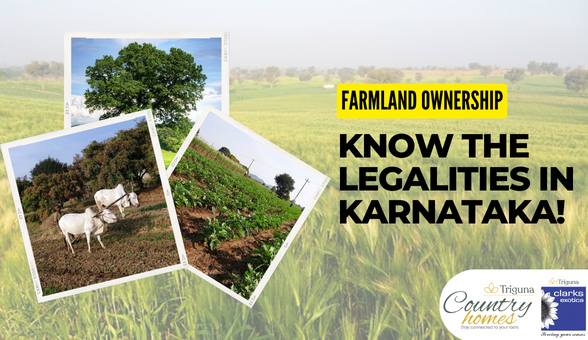In comparison to buying a conventional plot of land, purchasing agricultural land comes with several difficulties and demands more research especially on the legal front. The key question here is, how to identify these legal challenges and ways to eliminate them?
The land is more susceptible to illicit occupation than flats or apartments, particularly if left unattended. Regardless of the developer, there are numerous factors that need to be examined and verified before purchasing the site. If you’re considering investing in farmland in Karnataka, it’s important to understand the legalities surrounding farmland ownership in the state.
This guide will provide you with an overview of the laws and regulations governing farmland ownership in Karnataka so you are a little more cautious, diligent, and knowledgeable to avoid any real estate scam.
Legal Aspects of Farmland Ownership
1. Title Verification to confirm Land Ownership
The term “Title” refers to the rights that come with legal property ownership. A free and clear title is undeniable evidence of ownership. It ensures that the property documents are genuine and that there are no encumbrances or pending litigation related to the land. Title verification helps to avoid legal disputes and protects the investment made in the land. It is also essential for obtaining loans against the land. Also, a minimum of last 40 yrs land title verification is recommended while probing into the earliest document recorded.
-
Verity RTC (Record of Rights, Tenancy, and Crops):
Verify RTC for 40 years from the date of purchase to disclose flow of ownership, tenancy and other details.
-
Check Encumbrance Certificate (EC)
Liens, easements, leases, mortgages, and restrictive covenants are common encumbrances on real estate. Encumbrances impact the transferability and use of subject properties. EC should be verified for the name of person mentioned and should match with whom they are dealing.
-
7/12 Extract:
This is a document that provides information about the land, including the survey number, area, and ownership details.
-
Ask for Property Tax Receipts and Bills
To avoid taxation issue in future, ask for these bills. Also to check if there are no outstanding dues on the property, one must thoroughly verify these documents.
-
Examine Land Measurement Certificate:
Before purchasing agricultural land, one must get measured the exact agricultural plot area in order to establish the boundaries and to issue a land measuring certificate. It declares that the land measurements are accurate and consistent with the information in the title deed.
With an incorrect Title, the property has no value and one won’t have complete control on its purchases, sales, or mortgages. Overall, title verification is a crucial step that should not be overlooked while buying farmlands in India.
2. Other Documentation:
To ensure that the process of purchasing land is trouble-free, additional vital documents that demand careful consideration include the following:
- Sale Deed:
- Index of land
- Mutation Extract
- Family Tree History
- Patta Book
- Khata Certificate
- Survey Documents that include: Survey sketch, Akarband Extract, Hissa Tippani Book Extract, Tippani, Phodi Extract, Hudbust Register Extract, Atlas & Village Map
3. Fencing, Access Paths, and Demarcation
Fenced and demarcated farmlands help secure ownership rights and protect properties from intrusion. Thus, Investors should avoid putting their time, money, and effort into rural holdings that lack complete fencing, distinct access roads, and demarcations.
4. State Laws (Karnataka)
In some Indian states, regardless of one’s occupation, anyone can buy agricultural property, whereas in other states, only farmers are permitted to do so.Different states have different terms on this as agricultural lands fall under state jurisdiction.
Like in karnataka, earlier individuals without an agricultural background were not allowed to own agricultural land in the state, Until recently when new amendments came.Now, anyone can purchase agricultural land in KArnataka. Also you must know the ceiling limit of the number of lands that can be purchased by an individual..
5. Land Ceiling
The Present Karnataka Land Reforms Act (2020) introduced new amendments in purchasing agricultural land. Here are the new ceiling limits:
- Ceiling increased to 20 units per individual as opposed to the earlier limit of 10 units per individual. This means that the land ceiling for dry land has increased from 54 acres to 108 acres.
- Section 79A has been nullified which implies that your annual family income should not exceed 25 lacs. Now, anyone can own land as there is no income slab.
- Section 79B has been repealed; anyone from a non-farming background can now own agricultural land in Karnataka.
6. Physical Land Survey and Site Inspection
Physical verification of the land must be carried out with the aid of surveyors and government representatives in order to achieve clarity, precision, and transparency. Analyze boundaries and nature of abutting lands as well.
Purchasing agricultural land in Karnataka can be a complicated process due to the various legal restrictions in place. Before investing in farmland in the state, it’s crucial to understand the laws and regulations governing farmland ownership. Working with a qualified real estate agent or attorney can help you navigate the process and ensure that your investment is sound.
OR we got a better and simpler solution for you. Invest in Triguna Country Homes, well verified leaving no stone unturned, a 100 acres farmland community near Bangalore with all the modern amenities, nature and greenery.


